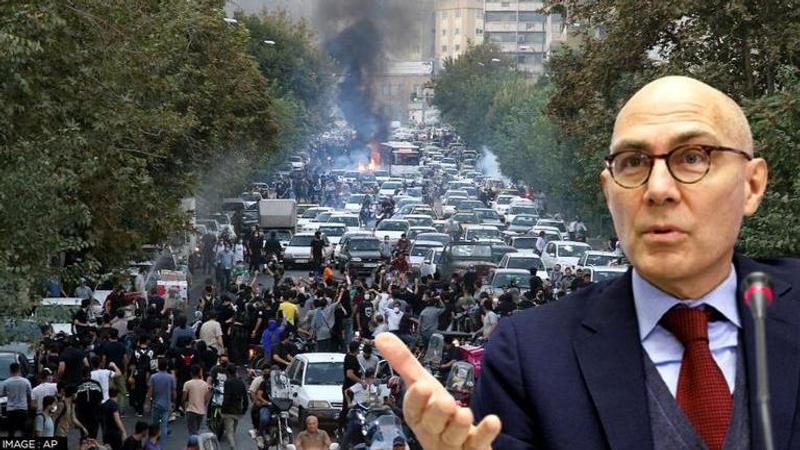Published 18:31 IST, January 10th 2023
UN Rights chief lambasts Iran for 'weaponising death penalty' amid nationwide protests
Iran is weaponising death penalty to scare protesters and stamp out dissent, UN human rights chief Volker Turk said, slamming the executions.

United Nations Human Rights Chief Volker Türk lambasted the Iranian regime on Tuesday for "weaponising the death penalty saying that the executions violated international human rights law. “The weaponization of criminal procedures to punish people for exercising their basic rights – such as those participating in or organizing demonstrations - amounts to state sanctioned killing,” Türk said. Criminal proceedings and the death penalty are being weaponized by the Iranian Government to punish individuals participating in protests and to strike fear into the population so as to stamp out dissent, which is in violation of international human rights law, Türk said in a statement.
These remarks come after four individuals were executed over the past month in the Iran regime's stringent relation to the anti-government protests in Iran. The individuals faced expedited trials that did not meet the minimum guarantees of fair trial and due process required by international human rights law binding on Iran, making their executions tantamount to arbitrary deprivation of life. “The Government of Iran would better serve its interests and those of its people by listening to their grievances, and by undertaking the legal and policy reforms necessary to ensure respect for diversity of opinion, the rights to freedom of expression and assembly, and the full respect and protection of the rights of women in all areas of life," said Türk.
Furthermore, Türk added, the death sentences were imposed following convictions on charges – such as moharebeh (waging war against God) and efsad-e fel arz (corruption on earth) – that fall far short of ‘the most serious crimes’ as required by international human rights law. This means crimes of extreme gravity, such as intentional killing.
Which protestors have been executed?
According to reports, the first of the four executions – that of Mohsen Shekari – was carried out on December 8, 2022. Four days later, Majdireza Rahanavard was executed just 23 days after his arrest on November 19. On January 7, 2023, Mohammad Mehdi Karami and Mohammad Hosseini were executed. All were executed secretly without their families being informed. "This in itself constitutes a violation of international human rights law," said a statement by the UN Human Rights Office of the High Commissioner.
The UN Human Rights Office said that it had received information that two further executions were imminent - that of Mohammad Boroughani, aged 19, and Mohammad Ghobadiou, aged 22. At least 17 others have been reportedly sentenced to death, and up to 100 more face charges for capital crimes.
Thousands have been detained since the nation-wide protests erupted last September following the death of 22-year-old Mahsa Amini, who died shortly after she was arrested for improperly wearing her hijab. Hundreds have died in the government crackdown against the demonstrators.
“I reiterate once more my call to the Government of Iran to respect the lives and voices of its people, to impose an immediate moratorium on the death penalty and to halt all executions,” the High Commissioner for Human Rights said. “Iran must take sincere steps to embark on the reforms that are required and demanded by their own people for the respect and protection of their human rights," he added.
Three more protestors sentenced to death
Iran's judiciary has sentenced three more men, Saleh Mir-Hashemi, Majid Kazemi, and Saeed Yaghoubi, to death for "war against God" for their alleged role in the shooting of three government agents during a day of protests in the Khane-ye Esfahan neighborhood on November 16, as per a report by Iran International. The verdicts were based on confessions made in the absence of lawyers appointed by the accused and are subject to appeal, but in previous cases involving protesters, the appeal process has not overturned verdicts in what many believe to be sham trials. Another defendant, Amir Nasr-Azadani, a footballer, was sentenced to 21 years in prison on charges of "aiding in the war against God" and "assembly and collusion leading to security-related crimes".
Updated 18:47 IST, January 10th 2023




